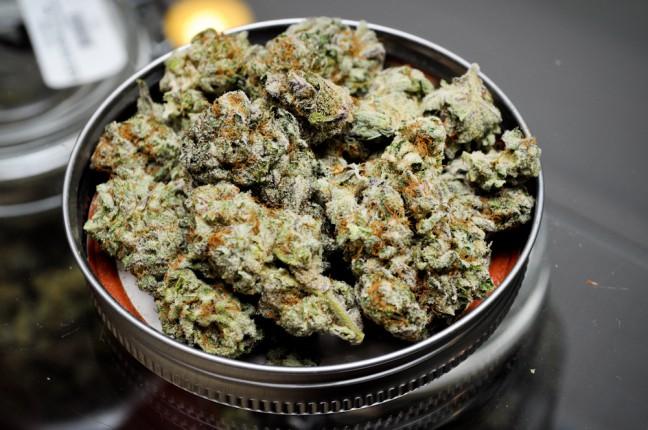As more states choose to legalize marijuana, many Wisconsinites wonder if the dairy state will be the next to allow recreational or medicinal use of the plant.
Twenty-nine states have legalized marijuana for either medical or recreational use. California, Massachusetts and Nevada on Nov. 8 became the latest states to opt for legal recreational use. Wisconsin, however, is choosing to keep the drug illegal for both recreational and medical use. Currently in Wisconsin, possession of marijuana is a misdemeanor that could result in a fine or jail time.
One exception in the Wisconsin law is for individuals with seizure disorders. Qualified patients are allowed to possess cannabidiol, a component found in marijuana. This chemical helps treat seizures and is not associated with producing a “high” for the consumer.
Despite Wisconsin’s stringent restrictions on the drug, a recent Marquette Law School poll shows that 59 percent of Wisconsin voters agree that marijuana “should be fully legalized and regulated like alcohol.”
Marijuana is still illegal under federal law in all 50 states due to federal prohibition, but many states break federal law in order to allow marijuana use in their state.
Barry Burden, UW political science professor, said legislators are leery of legalizing marijuana because of the current federal prohibition, and fear that marijuana can serve as a gateway drug.
Many states that have legalized marijuana have done so by referendums and not acts of legislators, Burden said.
Scott Chipman, Southern California Chair of Citizens Against Legalizing Marijuana, said states should not legalize marijuana because of the dangers of the drug.
Marijuana could have dangerous health affects, especially for young people, Chipman said. Many people do not know the dangers of marijuana, which Chipman claims include brain damage, cancer and increased danger behind the wheel. He said other states should consider these concerns before adopting marijuana reform.
Representative Melissa Sargent, D-Madison, has proposed many bills that aimed to loosen the laws restricting marijuana, but has seen little success. Sargent said legalization will benefit society in many ways. She claims lifting restrictions on this one plant can help problems in criminal justice, provide medicinal benefits, raise money for state though taxes and revive people’s personal liberties.
“The most dangerous thing about marijuana is that it is illegal,” Sargent said.
Minor drug offenses, like possession of marijuana, cause many people to find themselves in Wisconsin’s criminal justice system, leading to racial disparities in the prison system, Sargent said.
In Dane County, the 2013 Race to Equity report shows an African-American adult is 8.1 times more likely to be arrested than a white adult.
Sargent said legalizing marijuana will not fix the problem of racial disparities in Wisconsin’s criminal justice system, but it can be the first step in solving the issue. Madison Police Chief Mike Koval said Wisconsin is looking at the problem of drug use in the wrong way.
Koval said law enforcement in Madison has put possession of marijuana as a low priority on the list of criminal offenses. Instead of punishing people for minor drug possession we should be educating people about the risks associated with the drug, Koval said.
If Wisconsin is to move toward legalization there will need to be serious conversations about the other issues that accompany marijuana use, Koval said. Discussions about regulation, safety and accessibility are very important factors when looking at legalizing marijuana.
Many of the same concerns with alcohol apply to marijuana, Koval said. Preventing the drug from getting into the hands of minors and driving while under the influence of marijuana are just a few of the concerns that accompany legalization. There is also an inherent risk of the physical consequences of marijuana.
“Any time you are taking on drugs that are foreign to the body, whether that be beer or intoxicants or in this case marijuana, it is not necessarily good for the overall body’s health and wellness,” Koval said.
But Sargent said whether marijuana is harmful or a medicine, the government should have no place making decisions about what a person should or should not be able to do with their body. Legalizing marijuana does not mean everyone should it, but it gives the people that do choose to use it the ability to be more open and to not stigmatize marijuana users as criminals when they are our neighbors and friends, Sargent said.
But Chipman said the government has the responsibility to protect the safety of its citizens, which includes keeping marijuana illegal.
“The government has an important roll in promoting public health and safety,” Chipman said.
The issue of marijuana is very polarizing, Koval said. In the same Marquette poll 39 percent of people in Wisconsin have negative attitudes about the controlled substance. Fifty-five percent of Wisconsinites think the government should have “no business” in deciding what adults put in their body.
Sargent said marijuana is not an easy topic to discuss, and there has been almost a century of misinformation around the drug. Marijuana is hard to study because of it’s Schedule 1 classification by the Drug Enforcement Administration. Marijuana is listed along with Heroin, LSD and Ecstacy. If we look at the science behind it, continuing the prohibition on marijuana is not benefiting our society, Sargent said.
“Legalizing marijuana will increase prosperity, make a safer community and honor personal liberties at the same time which seems like a real home run,” Sargent said.


